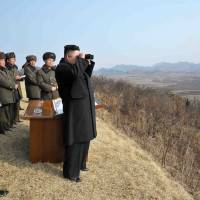Female Japanese directors were once like those rare species periodically discovered in Asian jungles and immediately labeled endangered. This year, however, in their highly individual ways, they made some of Japan’s strongest, most ambitious films. By now the only thing endangered is local industry prejudice about their range and abilities.
1. “Kazoku no Kuni (Our Homeland)”: Zainichi (ethnic Korean) director Yang Yong Hi used her own family’s troubled history in making this debut feature about a zainichi man (Arata Iura) visiting his family in Japan 25 years after being sent to the “paradise” of North Korea by his father. Seriously ill, he fiercely resents his situation and those who have placed him in it. Yang draws performances from her veteran cast raw in their intensity, but superbly crafted.
2. “Yume Uru Futari (Dreams for Sale)”: Miwa Nishikawa returns to her favorite theme — the varieties of human duplicity — with a story about a couple (Takako Matsu and Sadao Abe) who trick unsuspecting single women with offers of marriage to raise money for a new izakaya (pub) after their old one burns down. Despite the caper-comedy setup, the film is an unblinking, unsparing investigation of how the couple’s serial deceptions eat into their relationship — and their souls.
3. “Kitsutsuki to Ame (The Woodsman and the Rain)”: Shuichi Okita’s comedy about a 60-year-old lumberjack (Koji Yakusho) who comes to the rescue of a nervous tyro film director (Shun Oguri) making a zombie holocaust cheapie deftly mines comic gold from its unusual culture clash, while the lumberjack’s pure-hearted fascination with filmmaking reawakens us to the magic found in even bad B-movies.
4. “Fugainai Boku wa Sora wo Mita (The Cowards Who Looked to the Sky)”: Yuki Tanada’s drama about three people — a teenage boy (Kento Nagayama), his housewife lover (Tomoko Tabata) and his best friend (Masataka Kubota) — whose lives intertwine following an Internet shaming is unconventionally structured, with certain scenes retold from another character’s viewpoint. Though at times lumpy, her experiments in storytelling deepen our understanding of her central trio, while strongly underscoring their common tenacity.
5. “Outrage Beyond”: This sequel to a bloated 2010 yakuza epic by comedian/actor/director “Beat” Takeshi Kitano is a definite improvement on its predecessor, with a smarter, more satisfying story arc. As a smarmy, conniving police detective (Fumiyo Kohinata) pits a giant Tokyo gang against its Kansai rival, betrayal follows betrayal and the body count climbs in classic genre style, minus the also-classic sentimentality about gangster “chivalry.”
6. “Momo e no Tegami (A Letter to Momo)”: The title heroine of this Hiroyuki Okiura anime is not the usual spunky exemplar, but an ordinary girl who is scared out her wits when she discovers three yōkai (goblins) in her new house on an Inland Sea island. The ensuing comic chase is brilliantly headlong and funny, but Okiura manages the transition to more serious matters, including the title letter from the heroine’s dead father, with the craft of a true storyteller.
7. “Kagi Dorobo no Mesoddo (Key of Life)”: Kenji Uchida is known for his clever scripts, and the one for his latest film is no exception. But the story of a wimpy failed actor (Masato Sakai) who finds himself switching identities with a ruthlessly efficient hit man (Teruyuki Kagawa) is more than a well-made puzzle: It unlocks the lids we so often put on human possibilities, with the keys lost deep in our own pockets.
8. “Kibo no Kuni (The Land of Hope)”: In Sion Sono’s dystopian drama, a reactor accident in a near-future Japan (which has apparently learned nothing from the last one) impacts on an elderly farmer (Isao Natsuyagi) and his family, who find themselves inside an evacuation zone marked by Kafka-esque functionaries. Though stagey, the ensuing drama powerfully evokes the welter of emotions 3/11 disaster victims told Sono they were actually feeling.
9. “Kueki Ressha (The Drudgery Train)”: Based on an autobiographical novel by Kenta Nishimura, Nobuhiro Yamashita’s film about a junior high grad (Mirai Moriyama) with zero social skills and prospects rejects “slacker comedy” formula, including the commandment that its subject be sympathetic. The no-hope hero, however, is capable of surprising — and ends up being likable in his sheer cussedness.
10. “Atarashi Kutsu wo Kawanakucha (I Have to Buy New Shoes)”: A brief affair blooms between a lonely middle-aged expat in Paris (Miho Nakayama) and a lost young guy (Osamu Mukai) she guides around the city in Eriko Kitagawa’s romantic drama. Eschewing meet-cute cliches, Kitagawa films her bittersweet story with a graceful, tender naturalism and a fresh, flawless eye for the beauties of her setting — somehow making even the Eiffel Tower look new.







 Click to enlarge
Click to enlarge